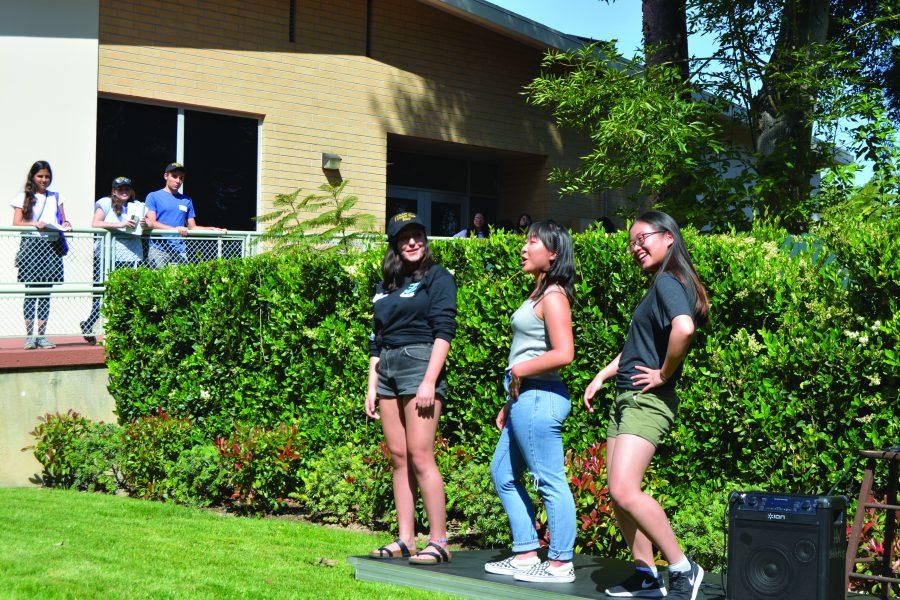Student poets from all over Los Angeles disembarked from school buses and poured onto the upper school campus. Ambassadors for the poetry festival led the poets up to Chalmers Lounge for breakfast and an opportunity to meet other poets from the area.
The festival, called “Wider Than the Sky: A Young People’s Annual Poetry Festival,” was a celebration of diversity, both in terms of the backgrounds of the poets attending and their writing techniques.
“All of the different kinds of people who are here at the event have an opportunity to see themselves reflected in the poets and the poems that we offer,” English teacher and director of the festival Darcy Buck said. “It brings in people from all different corners of Los Angeles, from lots of different high schools and middle schools. It brings people from a lot of different backgrounds, a lot of different perspectives.”
Through the theme of diversity, the festival also tried to encourage the young poets to recognize their own self-worth and self-importance through writing and sharing their writing.
“I think, especially for people from marginalized communities of any kind, those communities hear from a lot of the world that their selves don’t matter,” Buck said. “When you’re encouraged to express yourself, you’re being told the opposite of that: that your self is valuable, that what your self has to say is valuable.”

Sam Radlovic ’18, one of the ambassadors for the festival, said one of the main goals of the festival was to create an open and tolerant environment where poets could broaden their horizons.
“It would be really awesome to know that all of the kids here felt like they learned something, felt like they had fun and felt welcome,” Radlovic said.
Buck said the festival staff was especially concerned with establishing a climate in which all students, especially those without much writing experience, felt comfortable.
“Some of it is just for people that maybe thought about writing but have never written before,” Buck said. “‘How do you get started?’ ‘How do you continue?’”
She added that the festival was also a venue for people to share their work, even if they had never done so before.
“A lot of people today were super excited about the opportunity to take poems from the words on the page to the performance,” Buck said. “People were really excited to read aloud and listen to people read aloud. There’s something really cool and communal that happens.”
Aubrey Elwes ’18, who attended the festival, said what helped him grow the most as a writer was listening to the other poets attending and using their varied perspectives and approaches to writing as inspiration.
“Everyone has so many different ideas, whether it be some people looking at things and taking a broad view or others taking a more deep look into things,” Elwes said. “It helps map out your way as a writer and what you want to write about. It’s really cool listening to other people’s poetry and incorporating their ideas into your work.”

Drawing inspiration from other writers was also expressed through keynote speaker Claudia Rankine’s speech. Rankine discussed the role of her experiences with race in her writing as well.
“You want a destination for the African-American body in the American landscape,” Rankine said. “You call it, you name it, you write it, but you’re looking back at everything that came before.”
Though the festival was mostly centered around celebrating the different aspects of the poets attending that made them different, Buck said what makes “Wider Than the Sky” an important forum is its ability to bring writers together.
“Not everybody in the world loves poetry,” Buck said. “This is an opportunity for all of the people who like [poetry] to come together and connect with one another and celebrate it together. People are performing live and people are cheering, so I think it’s just really special for people to come together and share enthusiasm. You get to ‘geek out’ a little bit.”
The unity between people she saw at the festival and their willingness to share their work was a triumph for tolerance and confidence, Buck said.
“A student might say, ‘Oh, this writing in my notebook that I do actually is important, actually is valuable; the thing that I have to say about my life matters,’” Buck said. “We are affirming our own humanity, and we are affirming others’ humanity, and affirming the connections between ourselves.”































